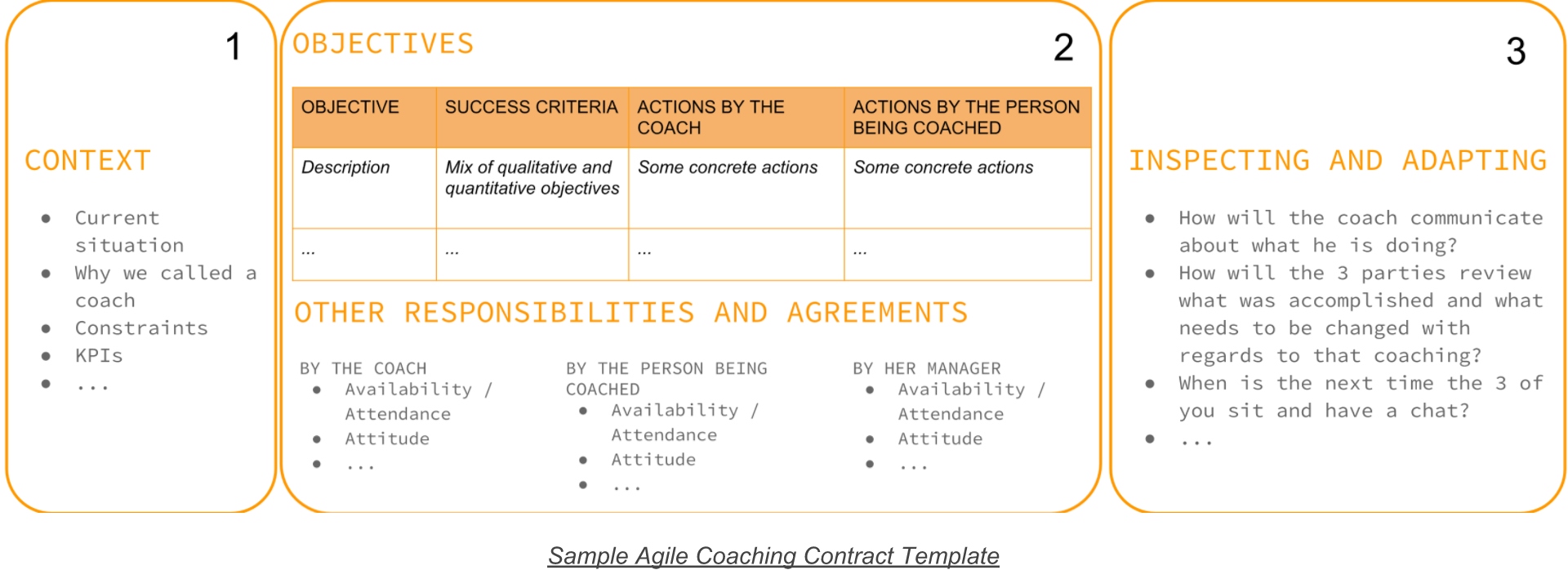You have joined an organization as an Agile Coach. You have a certain understanding of why you're here. Everybody in fact has a certain understanding of why you're here. Problem: they are all different.
Therefore
Sit (or stand up) with the main person whom you will be coaching (or whose team you will be coaching), as well as her manager. The 3 of you, write down an Agile CoachingContract¹.
Details
Contracts in general are to be handled with caution. They tend to limit your options before you know which is best, and they may spoil the collaboration between the parties. These are the main reasons why the Agile Manifesto itself suggests you should be careful with contracts.
But done well, an Agile Coaching Contract can be useful in a number of ways.
- You, the coach, will have a better understanding of why you're here and what is expected of you. Obviously, this part of the conversation is not one-directional. What is expected of you should be aligned with what you have to offer and also with what kind of help you think they need.
- The person you are coaching and her boss will know (and have the same understanding of) what they can/cannot expect from you. This may make your life much easier later.
- You will be able to tell in return what you need from them for those expectations to be met. This usually comes down to time, tools, communication, presence, that some specific actions be taken or that some impediments be removed. In situations where the presence of the Agile Coach has been decided top-down, this is particularly crucial because too often, I find that the organization has not set clear, proper objectives to the people you are coaching. By asking that the three of you sit down and write the Agile Coaching Contract, you are therefore helping them have this conversation they may not have had otherwise about what the boss expects of her employee.
I recommend using a simple, lightweight format. I also recommend you are careful the meeting where you write the contract itself keeps a "light touch" because you may be setting the tone of that relationship moving forward.

Writing an Agile Coaching Contract felt like an awkward idea at first, but overtime I realized that:
- Worst case scenario: things go smoothly and things would have gone equally smoothly without the contract. You will in this case have lost about 1 hour * 3.
- Best case scenario: You bring structure to a coaching that would otherwise have been fuzzy with blurry expectations. You create a momentum. You bring peace to the world.
The other thing that could arguably happen (but that never happened to me or anyone I know) is that while trying to write down the CoachingContract, you realize that your expectations, the expectations of the person you would coach and/or the expectations of that person's manager cannot be reconciled. While this might be a painful experience for one or all of the parties, this again should be seen as a positive outcome because you will have made that problem obvious before things got more complicated.
What did happen to me and some agile coaches I know quite a few times though, is that we would start coaching without a contract, thinking "this time we won't need it"; and several weeks later, we would already regret making that decision.
¹: I have left legal aspects out of this article because I am not qualified for this. If you want your contract to be enforceable in a court of law, you'd better look some place else.
Related articles: AskForFeedback